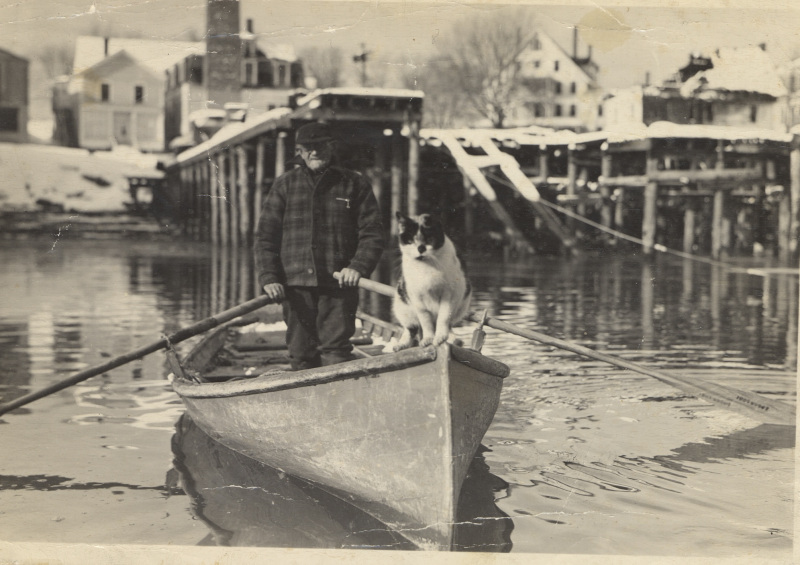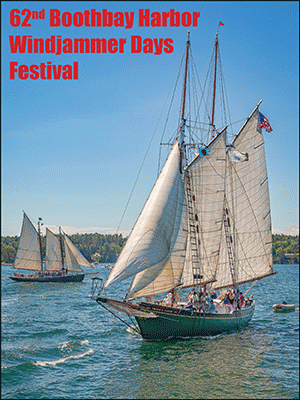I wrote this article in 2005 when Jean Durfee was still alive. It was always a treat to have Jean drop in the museum because she always brought something I’d never seen and was a real asset to local history. Toward the end of her life, I’d visit her on Road’s End where she enjoyed feeding a large flock of ducks; my visiting her was easier for her as she aged. She died in 2008.
Edgar
Jean brought in this great photo of Edgar Poor, rare because so many of our photos are not candid, mundane shots. Here we see Edgar with his cat in his boat in the typical clothes of the time in the Harbor. Jean told me it was before 1937, and I said, "No, it's right after the fire of 1945." She replied, "Sonny Simmons said it was before 1937 and there's nothing wrong with his mind." Sonny ran the funeral home with Hank Harrington for decades and I knew both of them. So I got off my certainty horse and checked Clifford's history. Sure enough, the cold storage on Commercial Street had burned in 1934—see the lone remaining chimney? The fire of 1945 wiped out much more in the same area; that’s what had me so sure and so wrong that it was 1945. The stump of the chimney lasted a long time, giving the Chimney Parking Lot its name. Behind the port side of the boat, you see the three-story white 1790s hotel, the Boothbay House, still in its long heyday at the top of Boothbay House Hill.
The Poors (often spelled Poore) have a long Boothbay history going back to the 1770s at least, and as long a fishing history. Edgar, born in 1874 and a lobster fisherman, married Josephine Dighton, and his sister Louisa married a Durfee. In an article about the waterfront fire of 1945, I mentioned Edgar lived in an engineless cabin cruiser on the west side of Boothbay Harbor and I described the efforts to pull his boat-home away from Ralph Scott's burning boat storage wharf. The boat Edgar's standing in must have been his mobile vehicle, powered by oars. He drowned in June 1946 in the Harbor at 72. I suppose even if he could swim, heavy soaked clothes and boots pulled him under.
Nat Poore
Nat Poore, a lobster fisherman like his first cousin Edgar, received Boothbay's Boston Post Cane in 1960 at age 90, presented by selectman Clint Barlow. Born in 1870, Nat went to sea on fishing vessels like Edgar, at age 17. He lived last with his son Sam Poore, where nine of his 12 children attended his birthday party when he was awarded the cane. In the late 1980s and early 1990s, I spent time with Hazel McCobb Poore, born 1909, which she always called “aught nine.” She'd moved to Linekin Neck upon marrying Ruel Poore late in the 1920s; she told me many "old-timey" stories about the Poores and life on the Neck and North Boothbay where she grew up. Both Hazel and Jean Durfee were two of a kind with sharp minds, often doing both women’s and men’s work, such as knitting mittens and bait bags, losbtering with their husbands, and so on.
Oscar Poor
Edgar Poor's father, Oscar Poor, was one of 12 children born to John Poor at Linekin. Oscar was born in 1830 and died in 1916, leaving 89 descendants including his 11 children. The Register did a story when Boothbay Harbor selectman John Brackett presented him with the Boston Post Cane in 1915. The article reported he was born in 1827, but people back then often lost track of their age. The Boothbay town records and the impossibility of his shipping on a vessel before it was launched fix his birth in 1830.
Oscar went to sea as a cook at age eight with 12 total weeks of schooling under his belt, some at Southport, still then part of Boothbay, and some at the Dover school, located up along Ovens Mouth River. His first trip was on the new 45-foot fishing schooner Gold Hunter, built on Ovens Mouth River (below what was Chet and Joan Rittall's house) by Washington Reed in 1837. She usually fished the Grand Banks but Oscar’s first trip was to Bay Chaleur in St. Lawrence Bay. Oscar fished aboard her over the side like the other men when he wasn’t busy cooking. I doubt he clutched a teddy bear or that the men aboard sung him lullabies. He was a small man at eight.
Fishing stayed a very hard life for men (and some women) for a very long time, and I’m sure in some ways it still is despite all the modern conveniences.
































.png)
.png)


